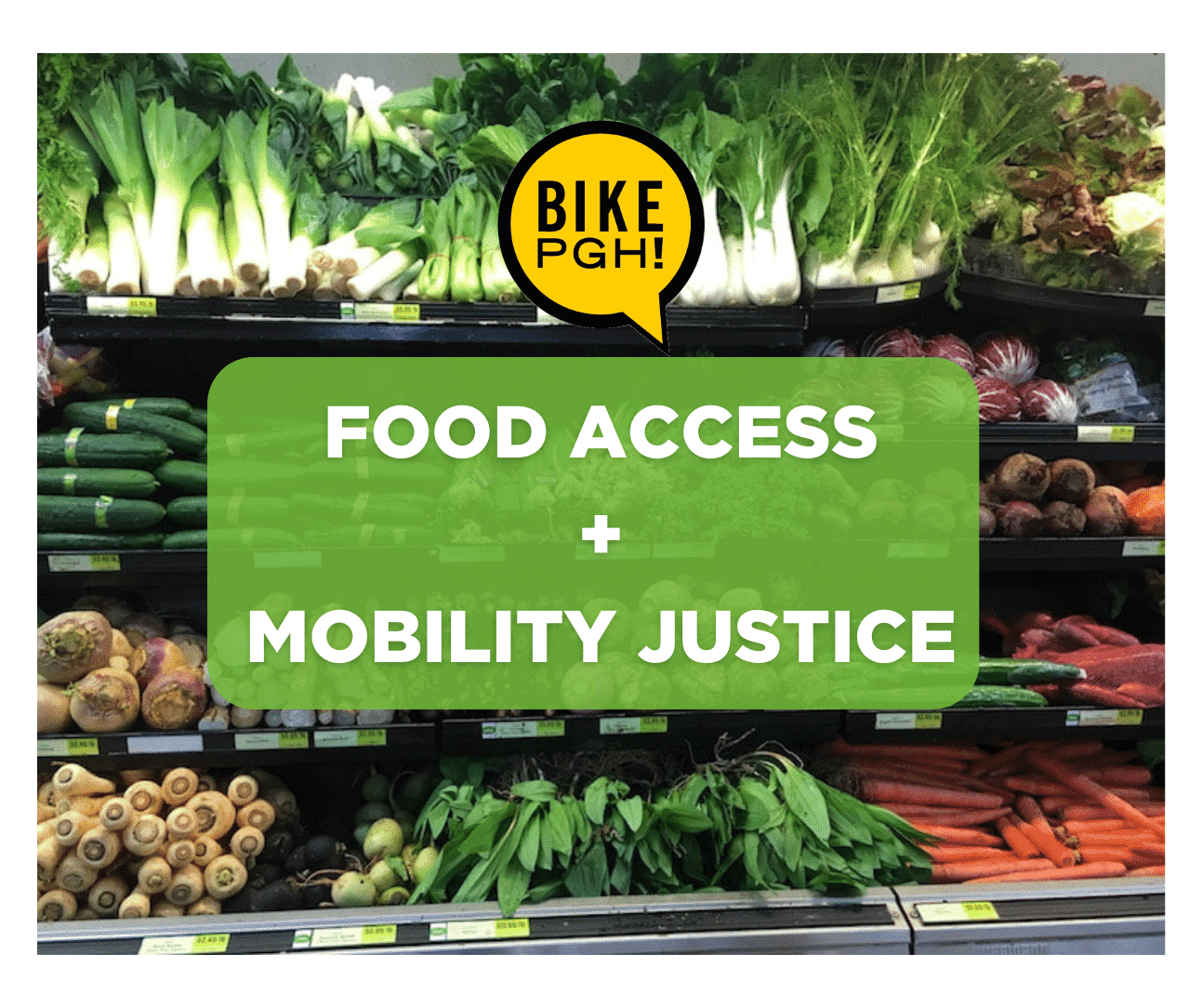
How can we combat food insecurity in Pittsburgh and beyond, and where does transportation advocacy come into play?
by BikePGH Staff Contributor – Thom Harr
Mobility justice is closely tied to having enough quality food to live a nutritionally sound life. When people struggle to get around easily and affordably, it often means that they struggle to obtain healthy food. When we talk about making transportation fair, we aren’t just talking about physically getting from one place to another; we must also focus on removing the obstacles that prevent access to the places where everyone and anyone can obtain the food they need to live a healthy, quality life.
Food Deserts and Food Apartheids
A Food Desert is traditionally defined as an urban area in which it is difficult to buy affordable or good-quality fresh food. While accurate, the term only tends to shine a narrow light on a much larger picture. Food Apartheid is a more comprehensive term, acknowledging that neighborhoods with insufficient options to healthy and affordable sources of food are not naturally occurring, nor lifeless, bleak areas – but often lively and active communities. Coined by activist Karen Washington, Food Apartheid goes beyond the geographical absence of grocery stores, highlighting systemic marginalization of certain communities in terms of food access. Low-income families and people of color are especially vulnerable, due to redlining, discriminatory lending practices, and unequal distribution of resources. These factors contribute to the concentration of lesser-quality food sources, such as fast food and convenience stores, in marginalized neighborhoods.
Comparing Pittsburgh with national data
In 2018, more than 11% of the population lacked consistent access to healthy and affordable groceries. In Pittsburgh, the rate of food insecurity, which is defined as the condition of not having access to sufficient food, or food of an adequate quality, to meet one’s basic needs, is estimated at 19.4% – meaning that 1 in 5 Pittsburgh residents live with food insecurity. (FeedPGH, July 2020). The stressors of living in a community affected by Food Apartheid in addition to poor nutrition can lead to increased risks of depression, heart disease, diabetes, obesity, and other diet-dependent diseases. To address food insecurity, we must look at social, economic, and policy-driven causes, and mobility is an important part of that. Providing financial aid and education to support healthy food access is unproductive if nutritious food is far away and/or inaccessible via safe streets, sidewalks, and accessible forms of transportation
Where Do We Go From Here?
As we come to realize and accept that food insecurity is a complicated issue that many Pittsburghers are facing, it is easy to be overwhelmed and unsure of where to begin. Progress is rarely made without action. To begin, we can support the organizations and advocates that recognize and rally for change by getting involved. Learn. Donate. Volunteer!
Having adequate access to food also requires having safe and connected ways to get to the store, whether you’re walking, rolling, or taking public transit. At BikePGH, our current campaigns Vision Zero, Safe Trips in the Strip and Stop Parking on the Sidewalk, put pedestrian safety at the forefront. Pittsburghers for Public Transit advocates for an expanded, affordable and accessible public transit system that meets all needs, with no communities left behind. POGOH offers a Mobility Justice membership and is working on providing an adaptive fleet of bicycles in addition to their e-bikes and standard bikes.
The Greater Pittsburgh Community Food Bank’s Food Justice is Social Justice initiative focuses on underserved communities in our region, and the city of Pittsburgh is working on a Food Justice Fund, and is looking for feedback.
Donate, volunteer, and speak up! Improving access for all is paramount, to ensure that everyone is able to obtain the food they need to live a healthy, quality life.
If you or someone you know is in need of help, there are resources available. Food programs, such as WIC, SNAP, FMNP, Food Bucks, and Food Rx are just to name a few. For further information the Code for Pittsburgh Food Access Map is a great resource to find help around the Pittsburgh region.